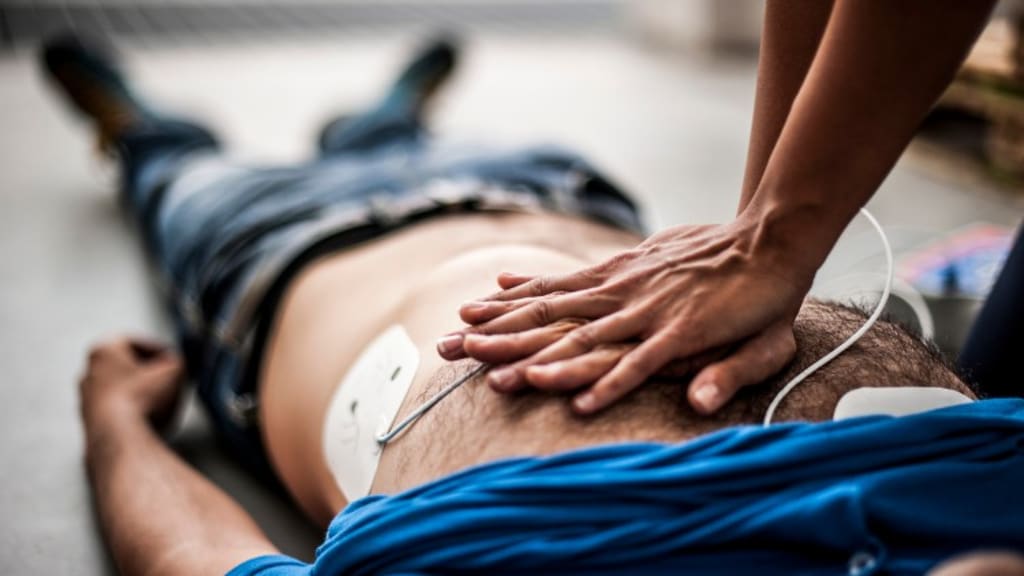The Home Doctor: Unlock the Secrets of Practical Medicine That You Need to Protect Your Family's Health
How to manage most emergency health situations when help is not on the way.

Do you ever feel overwhelmed when it comes to medical care for your family? With The Home Doctor, you can unlock the secrets of practical medicine and gain the knowledge and skills you need to protect your family’s health. From basic life support to managing most health situations when help is not on the way, The Home Doctor provides the guidance and resources to help you feel confident in taking care of your family. So let's get started and discover the power of The Home Doctor!
When to call a doctor
No matter how prepared you may feel, it is important to know when to call a doctor. Even though you have the Secrets of Practical Medicine and can Protect Your Family's Health, there are times when medical intervention is necessary. If you are trying to manage most health situations when help is not on the way and you are facing any of the following situations, it is important to call a doctor:
- Injuries that require more than first aid
- Symptoms that do not go away after home treatment
- High fever
- Severe pain
- Uncontrolled bleeding
- Any signs of infection such as redness, warmth, or swelling
- Chronic conditions that suddenly worsen
Knowing when to call a doctor is essential to ensure the safety and well-being of your family. It is important to pay close attention to changes in health and trust your instincts when it comes to seeking medical advice.
When to go to the hospital
There are certain health situations where you must seek professional medical attention and go to the hospital to protect your family's health. If you or a loved one experience any of the following, you should seek medical help immediately:
• Loss of consciousness
• Difficulty breathing
• Chest pain
• Severe allergic reaction
• Severe burns
• Severe bleeding
• Uncontrolled seizures
• Severe head injury
• Sudden confusion or disorientation
• Uncontrollable pain
• Broken bones
• Suspected poisoning
• Severe abdominal pain
If you find yourself in any of these situations, don't hesitate to go to the hospital. Prompt medical attention can save lives and help protect your family's health.
First aid
First aid is one of the most important skills you can have for protecting your family’s health. In an emergency situation, it can be the difference between life and death. It’s always important to remember that first aid should only be administered if you are trained to do so and if professional medical help is not available.
Basic first aid includes checking the airway, breathing, and circulation (ABC). If someone is unconscious, ensure that the person is in a safe environment and is on their back with their head tilted slightly to the side. Check their mouth for foreign objects and check if they are breathing. If not, administer CPR. If a person is bleeding, apply pressure and elevate the wound if possible. Minor wounds can be treated with a clean cloth, running water, and antiseptic.
If someone is having a seizure, it is important to remain calm and make sure that they are in a safe environment. Do not attempt to restrain them or put anything in their mouth. Place something soft underneath their head to protect them from injury and remove any sharp objects or other hazards in the area. Monitor their vital signs until help arrives.
In cases of extreme heat or cold, move the person to a safe environment as quickly as possible and monitor their body temperature. Wrap them in blankets if they are cold, and provide them with plenty of cool liquids if they are experiencing heat exhaustion.
By understanding basic first aid, you can ensure that your family is well-prepared for any medical emergency situation. Knowing when to call for help is also very important; if a situation seems too severe for you to handle alone, call for medical assistance immediately.
Basic life support
Basic life support (BLS) is a set of medical techniques that can be used to treat and stabilize a person who is unresponsive or not breathing. It includes assessing airway, breathing and circulation, delivering rescue breaths and chest compressions, using an automated external defibrillator (AED), and other related interventions.
In order to properly perform basic life support, you must know how to recognize a cardiac arrest and initiate CPR immediately. This involves delivering 30 chest compressions followed by two rescue breaths, repeating the cycle until medical help arrives. It is important to maintain the rhythm of chest compressions, as this is what helps circulate oxygenated blood to the heart. In addition, it is critical to place the AED pads correctly and turn it on, so that it can detect if a shock able rhythm is present.
It is also important to know how to correctly insert an airway adjunct such as an oral or nasal airway. This helps keep the airway open so that rescue breaths can be delivered. Additionally, it is important to check for signs of circulation such as pulse or respiration. If there are no signs of life, then chest compressions should be resumed until help arrives.
Basic life support is a critical skill that everyone should have in their toolkit. By being prepared and knowing the basics, you can save a life when help isn't on the way.
Common household poisons
Every home has the potential to be hazardous, with many common household items and products posing a risk of poisoning. Accidental poisonings are one of the most frequent causes of death in young children. To keep your family safe, it’s important to be aware of the risks and take appropriate steps to protect them.
The most common household poisons include:
• Cleaning products, such as bleach and other disinfectants.
• Cosmetics and personal care items, such as nail polish remover or hair dye.
• Medications, including both over-the-counter (OTC) and prescription drugs.
• Pesticides, herbicides, and insecticides.
• Batteries, including button batteries, rechargeable batteries, and car batteries.
• Plants and flowers, some of which are toxic if ingested or handled.
• Lead paint chips or dust.
• Alcoholic beverages and alcoholic product containers.
When it comes to household poisons, prevention is key. It’s essential to store all potentially hazardous items in childproof containers, out of reach of children and pets. Also, make sure all medications are kept in their original containers with the labels intact. Finally, be sure to follow the directions on any cleaning product labels and wear protective clothing when using them.
If someone has been exposed to poison, the most important thing is to remain calm and call for help right away. Depending on the type of poison and the age of the victim, the doctor may recommend treatment at home or at a hospital.
Managing stress
Managing stress is important for staying healthy and keeping your family safe. Everyone experiences stress in their lives, but it is how you cope with it that matters. Here are some tips to help manage stress:
• Exercise regularly: Exercise can help reduce stress by releasing endorphins and providing an outlet for physical and emotional energy.
• Eat a balanced diet: Eating a healthy diet with plenty of fruits and vegetables helps keep your body fueled and energized, making it easier to manage stress.
• Get enough sleep: Adequate sleep helps keep your energy levels up and makes it easier to handle stress.
• Take breaks: Taking breaks from time to time helps to reset your mind and body, allowing you to come back to the task at hand refreshed and ready to tackle it.
• Practice relaxation techniques: Deep breathing, meditation, or yoga can help relax the body and mind and reduce stress.
• Talk it out: Talking to a friend or family member about your stress can be very helpful in relieving it. It can also be beneficial to talk to a therapist or join a support group if needed.
Remember, it is important to take care of yourself and prioritize your mental health when managing stress. If you are feeling overwhelmed or like you are struggling to cope, reach out for help.
Dealing with anxiety
Anxiety can be an overwhelming feeling, but it’s important to understand how to manage it. Anxiety is a normal response to stress, but if it becomes extreme it can interfere with your everyday life. Symptoms of anxiety include difficulty concentrating, restlessness, and physical signs such as sweating or a racing heart.
The first step to managing anxiety is to recognize the signs and symptoms. Once you are aware of your feelings, you can begin to develop coping strategies. Here are some tips that may help you manage your anxiety:
1. Practice relaxation techniques such as deep breathing, progressive muscle relaxation, and mindfulness meditation.
2. Develop healthy lifestyle habits such as regular exercise and healthy eating.
3. Talk to your family and friends about your anxiety and get their support.
4. Schedule regular time for yourself each day and make sure you use it to relax and unwind.
5. Find activities that you enjoy doing and practice them regularly.
6. Seek professional help if necessary. Talking to a therapist or counselor can be very helpful in managing your anxiety.
It’s important to remember that anxiety is a normal emotion, and it doesn’t have to take over your life. With the right tools and support, you can learn to cope with your anxiety and live a happier, healthier life.
Depression
Depression is a serious medical condition that can cause changes in a person’s thoughts, feelings, and behavior. It can affect all aspects of a person’s life, from work and relationships to self-esteem and physical health.
Common symptoms of depression include persistent sadness, fatigue, changes in appetite, difficulty concentrating, and thoughts of suicide. If you or someone you know is exhibiting any of these symptoms, it’s important to seek professional help right away.
When it comes to treating depression, there are several options available. Medication can be prescribed to help manage the symptoms, but many people also find success with therapy and lifestyle changes. A mental health professional can provide helpful information and support in finding the right treatment plan.
In addition to seeking professional help, it’s important to practice self-care when dealing with depression. Exercise can help to boost mood, as can eating a balanced diet, engaging in enjoyable activities, getting enough sleep, and connecting with family and friends. Practicing relaxation techniques such as yoga or mindfulness can also help to relieve stress and improve overall well-being.
If you or someone you know is struggling with depression, it’s important to remember that there is hope. With the right support and resources, it is possible to manage the symptoms and live a full and happy life.
Sleeping disorders
Sleeping disorders can range from mild to severe, and can disrupt the quality of your life. While they can be difficult to diagnose, they are treatable with the right approach and knowledge. Knowing the signs and symptoms of sleeping disorders can help you recognize them and get help as soon as possible.
The most common types of sleeping disorders include:
Insomnia: Insomnia is a condition where a person is unable to fall asleep or stay asleep for an adequate amount of time. People with insomnia often feel exhausted and have difficulty functioning during the day due to their lack of restful sleep.
Sleep Apnea: Sleep apnea is a disorder characterized by pauses in breathing while asleep. These pauses can last for several seconds or even minutes and may occur several times an hour throughout the night. If left untreated, sleep apnea can lead to serious health issues including heart attack, stroke, and high blood pressure.
Restless Leg Syndrome: Restless leg syndrome is a condition that causes an uncontrollable urge to move the legs while resting or sleeping. This urge is often accompanied by uncomfortable sensations such as tingling, aching, or itching in the legs. It is thought that this disorder is caused by an imbalance in the neurotransmitters responsible for controlling movement.
Narcolepsy: Narcolepsy is a disorder that causes extreme daytime sleepiness, even after getting adequate amounts of restful sleep. People with narcolepsy may also experience sudden “sleep attacks” in which they fall asleep without warning and for no apparent reason.
If you think you may be suffering from any type of sleeping disorder, it’s important to consult your doctor for an accurate diagnosis and appropriate treatment. Treatment may involve lifestyle changes, medications, or other therapies depending on the type and severity of the disorder. Taking steps to improve your sleep habits, such as sticking to a regular sleep schedule and avoiding stimulants like caffeine in the evening, can also help manage sleeping disorders.
About the Creator
Heba Al. Saidy
Passionate about helping others live their healthiest lives. Sharing practical tips to empower individuals to mange their health. Let's work together to create a healthier world.






Comments
There are no comments for this story
Be the first to respond and start the conversation.